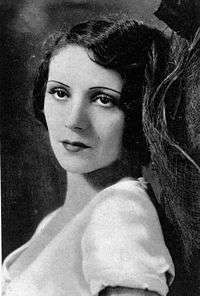Rosita Moreno
Rosita Moreno (born Gabriela Victoria Viñolas; March 18, 1907 – April 25, 1993) was a Spanish film actress who worked in cinema in Hollywood, Argentina, Mexico, and in her native Spain. She was born in Madrid, Spain.[1]
Rosita Moreno | |
|---|---|
 | |
| Born | Gabriela Victoria Viñolas 18 March 1907 Madrid, Spain |
| Died | 25 April 1993 (aged 86) Hollywood, Los Angeles, California, U.S. |
| Nationality | Spanish |
| Occupation | Actress |
Notable work | El día que me quieras (1935) |
Biography
Moreno was the daughter of Spanish character actor Francisco Moreno, who also developed a Hollywood career.[2] As a child she devoted herself to acting in revue and zarzuela genres.
Moreno appeared in more than 30 films in a career that spanned more than 20 years, often travelling through several countries in quick succession. She made her screen debut alongside her father in the 1930 film Amor audaz, co-starring Adolphe Menjou. The same year she appeared in the Spanish-language version of Paramount on Parade, released by Paramount Pictures.[3] In 1931, she co-starred in Stamboul, released by Paramount British. In 1935, Moreno paired with Carlos Gardel in two significant films, El día que me quieras[4] and Tango Bar.[5] The same year, she was selected for the main role in Piernas de seda.[6]
She also worked with Richard Arlen (The Santa Fe Trail, 1930),[7] Clara Bow (Her Wedding Night, 1930),[8] Cary Grant (Ladies Should Listen, 1934),[9] and Noël Coward (The Scoundrel, 1935),[10] among others.
She made her last appearance in 1949 in an episode of The Clock, a suspense/anthology TV-series based on an ABC Radio Network series which ran from 1946 through 1948.[11] In this episode she shared leading roles with George Reeves.[12] Little is known about her after that point.
Rosita Moreno died in 1993 in Hollywood, Los Angeles, at the age of 86 from undisclosed causes.[1]
Selected filmography
- Paramount on Parade (1930)
- El rey de los gitanos (1933)
- Walls of Gold (1933)
- Las fronteras del amor (1934)
- The House of a Thousand Candles (1936)
- Tengo fe en ti (1940)
References
- "Rosita Moreno profile at IMDb.com".
- Francisco Moreno profile, IMDb.com; accessed 19 March 2015.
- Amor audaz (1930) entry, imdb.com; accessed 19 March 2015.
- El día que me quieras (1935) entry, imdb.com; accessed 19 March 2015.
- Jorge Finkielman (24 December 2003). The Film Industry in Argentina: An Illustrated Cultural History. McFarland. p. 194. ISBN 978-0-7864-8344-0.
- Piernas de seda (1935) entry, imdb.com; accessed 19 March 2015.
- The Santa Fe Trail (1930) entry, imdb.com; accessed 19 March 2015.
- Her Wedding Night (1930) entry, imdb.com; accessed 19 March 2015.
- Ladies Should Listen (1934) entry, imdb.com; accessed 19 March 2015.
- The Scoundrel (1935) entry, imdb.com; accessed 19 March 2015.
- The Clock (1949–1952) entry, imdb.com; accessed 19 March 2015.
- The Clock: Season 1, Episode 4 (09/28/1949), imdb.com; accessed 19 March 2015.